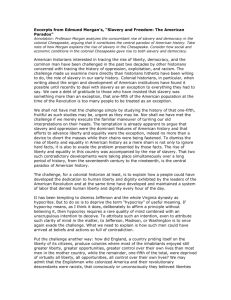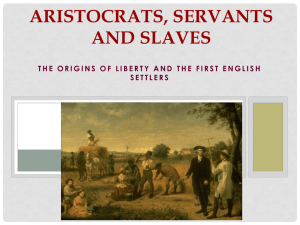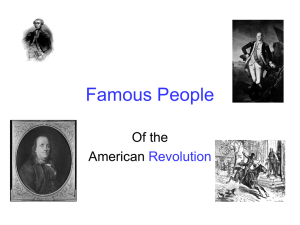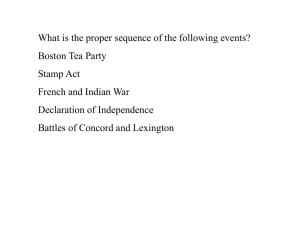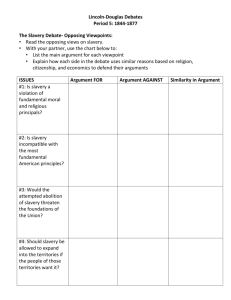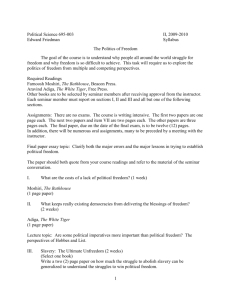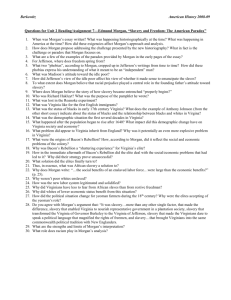Slavery and freedom Paradox
advertisement
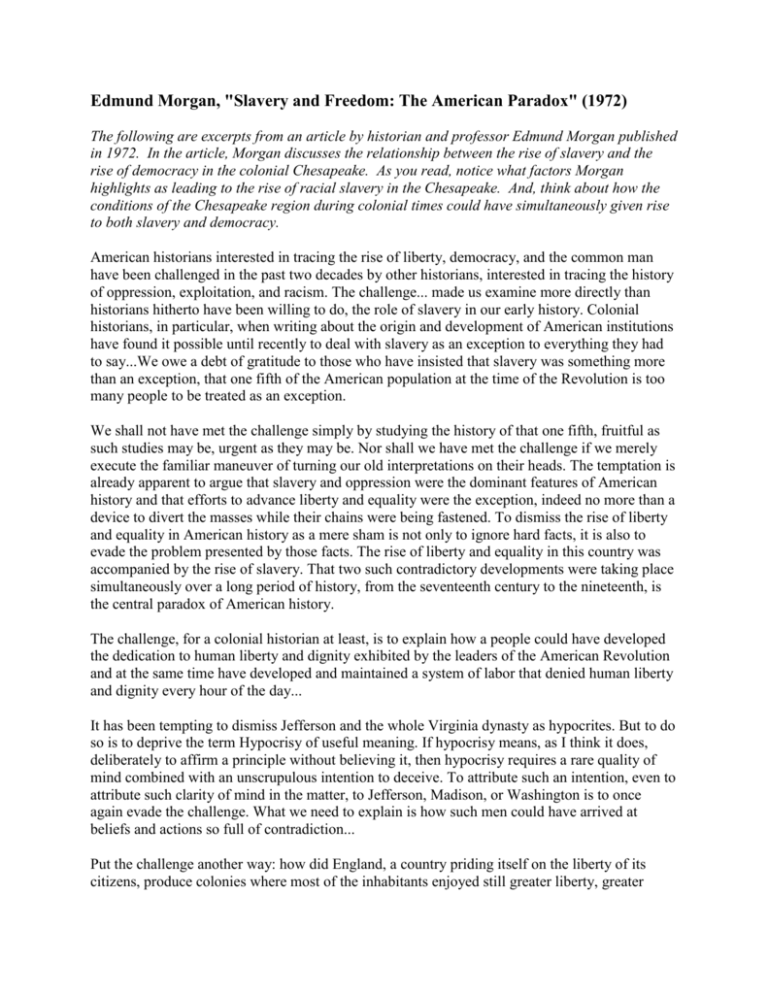
Edmund Morgan, "Slavery and Freedom: The American Paradox" (1972) The following are excerpts from an article by historian and professor Edmund Morgan published in 1972. In the article, Morgan discusses the relationship between the rise of slavery and the rise of democracy in the colonial Chesapeake. As you read, notice what factors Morgan highlights as leading to the rise of racial slavery in the Chesapeake. And, think about how the conditions of the Chesapeake region during colonial times could have simultaneously given rise to both slavery and democracy. American historians interested in tracing the rise of liberty, democracy, and the common man have been challenged in the past two decades by other historians, interested in tracing the history of oppression, exploitation, and racism. The challenge... made us examine more directly than historians hitherto have been willing to do, the role of slavery in our early history. Colonial historians, in particular, when writing about the origin and development of American institutions have found it possible until recently to deal with slavery as an exception to everything they had to say...We owe a debt of gratitude to those who have insisted that slavery was something more than an exception, that one fifth of the American population at the time of the Revolution is too many people to be treated as an exception. We shall not have met the challenge simply by studying the history of that one fifth, fruitful as such studies may be, urgent as they may be. Nor shall we have met the challenge if we merely execute the familiar maneuver of turning our old interpretations on their heads. The temptation is already apparent to argue that slavery and oppression were the dominant features of American history and that efforts to advance liberty and equality were the exception, indeed no more than a device to divert the masses while their chains were being fastened. To dismiss the rise of liberty and equality in American history as a mere sham is not only to ignore hard facts, it is also to evade the problem presented by those facts. The rise of liberty and equality in this country was accompanied by the rise of slavery. That two such contradictory developments were taking place simultaneously over a long period of history, from the seventeenth century to the nineteenth, is the central paradox of American history. The challenge, for a colonial historian at least, is to explain how a people could have developed the dedication to human liberty and dignity exhibited by the leaders of the American Revolution and at the same time have developed and maintained a system of labor that denied human liberty and dignity every hour of the day... It has been tempting to dismiss Jefferson and the whole Virginia dynasty as hypocrites. But to do so is to deprive the term Hypocrisy of useful meaning. If hypocrisy means, as I think it does, deliberately to affirm a principle without believing it, then hypocrisy requires a rare quality of mind combined with an unscrupulous intention to deceive. To attribute such an intention, even to attribute such clarity of mind in the matter, to Jefferson, Madison, or Washington is to once again evade the challenge. What we need to explain is how such men could have arrived at beliefs and actions so full of contradiction... Put the challenge another way: how did England, a country priding itself on the liberty of its citizens, produce colonies where most of the inhabitants enjoyed still greater liberty, greater opportunities, greater control over their own lives than most men in the mother country, while the remainder, one fifth of the total, were deprived of virtually all liberty, all opportunities, all control over their own lives? We may admit that the Englishmen who colonized America and their revolutionary descendants were racists, that consciously or unconsciously they believed liberties and rights should be confined to persons of light complexion. When we have said as much, even when we have probed the depths of racial prejudice, we will not have fully accounted for the paradox. Racism was certainly an essential element in it, but I should like to suggest another element, that I believe to have influenced the development of both slavery and freedom as we have known them in the United States... One development was crucial, and that was the appearance in Virginia of a growing number of freemen who had served their terms but who were now unable to afford land of their own except on the frontiers... By 1676 it was estimated that one fourth of Virginia’s freemen were without land of their own... The presence of this growing class of poverty-stricken Virginians was not a little frightening to the planters who had made it to the top...They wanted the [indentured servant] immigrants who kept pouring in every year. Indeed, they needed them...but as more [indentured servants] turned free every year Virginia seemed to have inherited the problem that she was helping England to solve. Virginia, complained...[the] secretary of the colony, was a sink to drain England of her filth and scum. The men who worried the upper crust looked even more dangerous in Virginia than they had in England. They were, to begin with, young...and the young have always seemed impatient of control by their elders and superiors, if not downright rebellious. They were also predominantly single men...Finally, what made these wild young men particularly dangerous was that they were armed and had to be armed... Virginia’s poor had reason to be envious and angry and against the men who owned the land and imported the servants and ran the government... The nervousness of those who had property worth plundering continued throughout the century... [One solution] was to extend the terms of service for servants entering the colony... but [as] the ranks of freedmen grew, so did poverty and discontent...[But, there was a] solution which allowed Virginia’s magnates to keep their lands, yet arrested the discontent and the repression of other Englishmen [living in Virginia]... the rights of Englishmen were preserved by destroying the rights of Africans. Slaves could be deprived of the opportunity for association and rebellion. They could be kept unarmed and unorganized... And since color disclosed their probable status, the rest of society could keep close watch on them... [The freedman] was no longer a man to be feared. This fact, together with the presence of a growing mass of alien slaves, tended to draw the white settlers closer together and to reduce the importance of class difference between yeoman farmer and large plantation owner.
